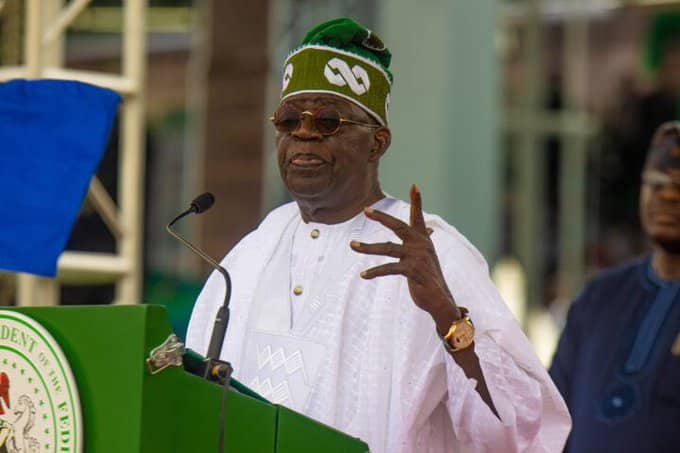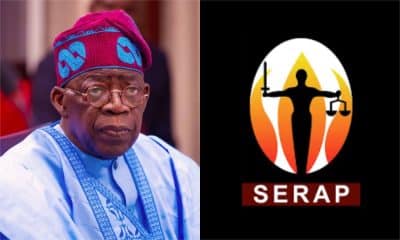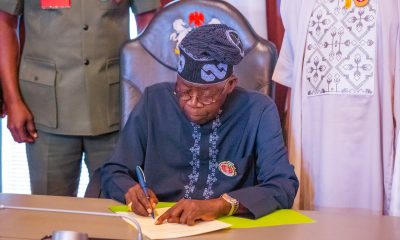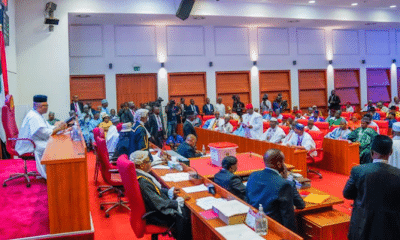Nigeria News
Flashback: ‘Fuel Subsidy Is Gone’ – Tinubu Declares On This Day Last Year

On this day last year, President Bola Ahmed Tinubu declared that the era of subsidy on Premium Motor Spirit (PMS), better known as petrol or fuel, is gone.
Naija News recalls that Tinubu, who won the 2023 presidential election on the platform of the All Progressives Congress (APC), took an oath into office on May 29, 2023.
During his inaugural speech, the former Governor of Lagos State announced that his administration would remove the subsidy on petroleum products.
“Subsidy is gone”, Tinubu exclaimed during his inaugural address at Eagle Square in Abuja, shortly after he was sworn in as the 16th President of Nigeria.
According to him, the national budget did not include a subsidy provision from June 2023, and therefore, it has been removed.
It is a year today that Tinubu made this announcement and Nigerians are yet to recover from the impact of this decision.
Tinubu, who was sworn into office alongside Vice President Kashim Shettima, the former governor of Borno State, also promised to lead the country with “compassion and amity towards all.”
“In economy, we’ll target not less than 6 per cent growth in GDP growth. We’ll do this through budgetary reforms. We’ll use a full range of domestic manufacturing and lessen importation,” Tinubu said in his inaugural address at Eagle Square, Abuja.
Tinubu, who made a commitment to enhance foreign direct investment by thoroughly examining all grievances regarding excessive tax burdens, with the aim of resolving them, also said: “To our foreign investors, our government will review all complaints about multiple taxations. All businesses will be allowed to repatriate hard-earned profits back home.”
Impact Of Fuel Subsidy Removal
Naija News reports that the removal of fuel subsidies in Nigeria has had a significant impact on the country and its citizens. Nigerians have continued to groan over its effects with more ‘unfavourable’ policies implemented by the incumbent administration led by Tinubu.
Below are 10 effects of fuel subsidy removal on Nigerians.
1. Increased cost of living: The removal of fuel subsidies led to an increase in the cost of fuel, which has a ripple effect on the prices of goods and services, leading to a higher cost of living for Nigerians.
2. Higher transportation costs: With the increase in fuel prices, transportation costs have also risen, affecting commuters and businesses that rely on fuel for their operations.
3. Inflation: The removal of fuel subsidies has contributed to inflation in Nigeria, as the prices of goods and services have increased significantly.
4. Hardship for low-income households: The removal of fuel subsidies has disproportionately affected low-income households, who struggle to afford basic necessities due to the increased cost of living.
5. Increased electricity tariffs: The removal of fuel subsidies has also led to an increase in electricity tariffs, as the government seeks to reduce its spending on subsidies.
6. Economic hardship: The removal of fuel subsidies has led to economic hardship for many Nigerians, as the increased cost of living has reduced their purchasing power.
7. Unemployment: The removal of fuel subsidies has also led to job losses, as businesses struggle to cope with the increased cost of operations.
8. Increased poverty: The removal of fuel subsidies has pushed more Nigerians into poverty, as they struggle to afford basic necessities.
9. Social unrest: The removal of fuel subsidies has led to social unrest, with protests and demonstrations against the government’s decision.
10. Economic growth: However, the removal of fuel subsidies is expected to lead to long-term economic growth, as the government seeks to invest in other sectors and reduce its spending on subsidies.
However, the Tinubu administration has been working to mitigate the effects of the fuel subsidy and other policies through various social intervention programs and economic reforms.












